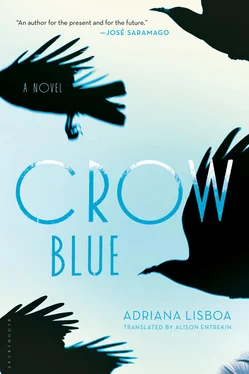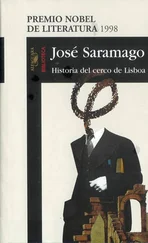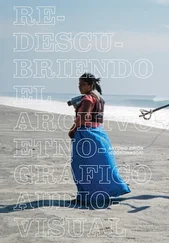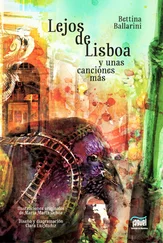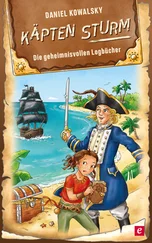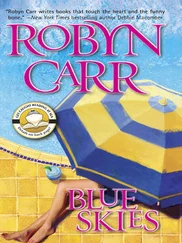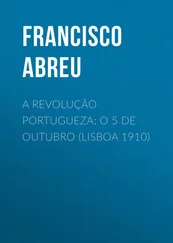And she stared and stared and kept staring. Until she found what she was looking for.
When I woke up in the motel in Albuquerque, I was alone. There was a note in Carlos’s handwriting in Portuguese (dictated, of course) on the bedside table. WE’VE GONE TO BRAEKFAST. WE DIDNT WANT TO WAKE YOU. WE’LL BRING A BAGEL. I had gone to bed with wet hair (where was my mother to tell me I shouldn’t do that? In what recess of my memory?) and an egg of hair had appeared on the right side of my head. I wet it in the sink. I combed it. It made no difference. I forgot about it and went out to find Fernando and Carlos.
They were eating breakfast in silence, staring at the huge TV on the wall in front of a group of squalid little tables. A politician was talking about politics on the TV.
You’ve got an egg on your head, said Fernando. Carlos laughed.
We drove around Albuquerque ceremoniously. Fernando was quieter than usual. Carlos jotted down the names of streets and any information that struck him as relevant in his notebook. We went to San Pablo Street Northeast and I was dismayed to discover that I remembered nothing of the house where I had spent the first two years of my life. Nothing. Zero.
It was like a slice of earth that had been removed from the ground. It had a dry garden in front of it just like Florence’s dry garden, but smaller. It had a dry tree. We got out of the car and wandered down the block aimlessly. It wasn’t as cold there but it was still cold and I pulled my stocking hat (which I’d put on to cure my messy hair) down over my ears.
There wasn’t the slightest recognition in me. Fernando could have been telling me a big lie, showing me a house chosen at random, and it wouldn’t have made any difference.
But there was recognition in him and it wasn’t easy and I knew it.
Did houses purge themselves of their former inhabitants with the arrival of their new inhabitants? Or were there several layers of ghosts in their memories, like layers of wallpaper? Did houses have memories?
Even if they didn’t, adult men did. Fernando had lived in that house with my mother for six years. Fernando had slept in that house with my mother for six years, and woken up, and looked at the dry tree when it was dry in the winter and when it was green in the summer and in all of its in-between stages. He had walked through those rooms for two thousand days. He had opened the door as he got home from work (which made me realize that I didn’t know what his job had been). He had closed the door as he left for work. And one day he had closed the door for the last time and it hadn’t been as he left for work.
Do you want to take a photo? Fernando asked.
I said yes and he took his old camera out of his jacket pocket and told Carlos and me to stand in front of the house (when we got the film developed, we would see that I had my eyes closed and Carlos’s mouth was a bit crooked, because he was about to say something or run his tongue over his parched lips).
Then we went back to the car and I considered the expedition to my early childhood over.
There wasn’t much else to do besides leave. Put those events in our pockets and leave. Celebrate Thanksgiving with June and her senile dogs the next day, and spend the two days after the next day at her place on Camino Sin Nombre, and scale the map again with our noses pointing north and the hope that the Saab wouldn’t decide to break down again.
Yes, of course, there were the Next Steps, and they were frighteningly toilsome. I searched my soul for energy, determination, courage, patience and other honorable sentiments. Other military-salute sentiments, the sort that make up the marrow of heroes.
But the next day and the day after that and the day after that still had something to say, before the rest of my once-again-post-New-Mexican life could begin. There was still, at least, a localizable vestige of my mother in Albuquerque, and that vestige was called Isabel and we were going to meet her.
Isabel appeared in a white kimono, the kind used by people who practise martial arts, tied with a green belt. I didn’t know if it put her down at the bottom of the hierarchy, up at the top or somewhere just so-so. Over it she was wearing a waterproof jacket that was very thick and very green.
She walked into the coffee shop where we had arranged to meet, picked her way through the people until she got to our table and hugged me. We were almost the same height. Then she shook Fernando’s hand with martial-arts vigor and Carlos’s hand with the same martial-arts vigor.
She sat down and looked at the enormous slice of chocolate cake that Carlos was eating and asked what’s that? Can I have a taste? And Carlos cut a (small) piece off with his fork and held it up to her mouth and thought it was funny. Him, a boy, feeding a grown woman. There was chocolate with chocolate filling and chocolate icing and pieces of chocolate negligently smeared around the Salvadorian boy’s mouth, but they disappeared politely into the Puerto Rican woman’s mouth.
And she said I’m always starving after practice.
And Carlos asked if she did judo or karate and she said aikido. And he said he’d never heard of it. And she said I’ll take you down later so you can see what it’s like.
We chatted. She and Fernando had two cups of coffee each. His without sugar. Hers with a full spoonful. We talked about places: Rio de Janeiro, Albuquerque, Colorado, Puerto Rico. We talked about people: me, my mother, my foster aunt, Carlos (we didn’t talk about Fernando).
Do you want to be an actress? I asked at some point.
I used to, she said. Before. But it didn’t end up happening.
But you studied theatre. June told us.
For a while. I came here to go to college.
So if you’re not an actress, what are you?
And she held her palms up and tilted her head to one side in a pantomime gesture.
I’m not anything.
But Carlos exclaimed, from his podium, that she did aikido (even though he didn’t know what aikido was, but it sounded Japanese and serious). A person who does aikido and wears aikido clothes can’t not be anything — was his argument.
And she laughed and said I’d like to have you all over for dinner at my place. Can you come? I bought some things that we used to make at your mother’s place — at your place (and she turned to me and then to Fernando, who could claim that possessive adjective to different degrees and for different reasons). For old times’ sake.
The old times were just that, old times. Times gone, past, yesteryear, a long time ago. Back when the “in” thing was for Isabel and my mother’s friends to get together in the house on San Pablo Street, when Fernando wasn’t part of Suzana’s life anymore and I had yet to be. So the old times were also pages from another calendar — and I thought again about what Pope Gregory had taken (I confess that I was kind of obsessed with the story: the omnipotence of a man of the cloth who stole time).
But we were there, we were with Isabel and having dinner with her seemed to be an imperative of the new times, more than an homage to the old. And at any rate she was enchanting. And at any rate we didn’t have anything else to do.
We followed her car from the coffee shop in Nob Hill to the suburb of Vista del Mundo, where she lived, in an enormous house that was one hundred percent contrary to anything that I might have imagined for her and her aikido clothes and green belt and green jacket, and her thin wrists and thick hair. It was enormous and looked a lot like the confectioner’s houses I had seen in Denver’s wealthy suburbs. It was a placid color in an undefined pastel tone and there was a cypress on each side of the door, like little green soldiers with conical bodies.
Isabel made mojitos for Fernando and herself and I noticed his relief at having the glass to put his hand on, and the rum to sip. It hadn’t been an easy day.
Читать дальше
